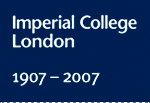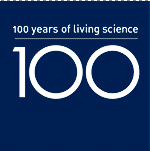Terance Boley
(Electrical Engineering, 1957)
shares his memories of lectures, balls and life-long friends
Listen to the interview here
Terance Boley I graduated in Electrical Engineering in 1957 after a strenuous three year course and on this particular occasion, it's 50 years since I graduated, and I organised a special dinner for as many of the graduates that we could get together. There were 13 of us having a dinner in the Rector’s house yesterday evening, very enjoyable. We all recognised each other, alarmingly enough, but most of us have lost hair, or it's a different colour, as you might well have imagined. One of the things I asked those present was whether they still had their notes of their course, because we never got handouts from any of the lecturers at that time. Some of them had thrown them away, and I pointed out that my wife had said that I couldn’t throw them away; it was a record that I should keep. But I did point out that having looked at these notes, I didn’t understand a word of it. The other amazing thing about the notes, which others have confirmed today, is that they are beautifully written in pen, all underlined, and it was all done during the lectures. None of us wrote them up afterwards. How we did it, is unbelievable. And it's all decipherable as well. Some other interesting things that we noticed when we come to the College now, is of course the buildings are completely different. Even more important is the fact that the lecture halls are actually fairly comfortable. We had wooden benches, effectively, no sound amplification at all, so it was all uncomfortable…
Betty Boley No coffee shops.
TB No coffee shops or anything like that. The bar, of course, was there, as it still is, but nothing like the present.
BB No common rooms.
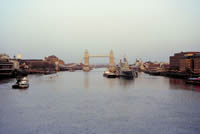 TB We had no common rooms. Professor Chung was telling me last night that every year has its own common room now. Certainly in the Electrical Engineering building, that’s unbelievable. We used to sit on the steps until otherwise. The other thing of course that is completely different, is we didn’t have computers at all. We did all our calculations with slide rules and sometimes with logarithm tables as well. The other change that you notice when walking around, is of course, dress. We tended to dress fairly formally. Most people wore a jacket or a blazer and a tie, except on days when like the boat race, Morphy Day and so on, when you were down on the river Thames and you were in danger of being thrown in the river, or pelted with flour or something similar. So there you did undress, but otherwise it was quite formal. Everybody carried briefcases to carry their notes around, and of course everybody wore a scarf, a college scarf. It was absolutely essential to have it wound around your neck. So these days, the informality is obvious now and of course the lecturers were always dressed in suits, very seldom were they not, unless you were in the laboratory where of course you would be wearing a laboratory coat of some sort. So this is quite a change. We also…
TB We had no common rooms. Professor Chung was telling me last night that every year has its own common room now. Certainly in the Electrical Engineering building, that’s unbelievable. We used to sit on the steps until otherwise. The other thing of course that is completely different, is we didn’t have computers at all. We did all our calculations with slide rules and sometimes with logarithm tables as well. The other change that you notice when walking around, is of course, dress. We tended to dress fairly formally. Most people wore a jacket or a blazer and a tie, except on days when like the boat race, Morphy Day and so on, when you were down on the river Thames and you were in danger of being thrown in the river, or pelted with flour or something similar. So there you did undress, but otherwise it was quite formal. Everybody carried briefcases to carry their notes around, and of course everybody wore a scarf, a college scarf. It was absolutely essential to have it wound around your neck. So these days, the informality is obvious now and of course the lecturers were always dressed in suits, very seldom were they not, unless you were in the laboratory where of course you would be wearing a laboratory coat of some sort. So this is quite a change. We also…
BB Very few women.
TB Very few women, in fact in my particular year, there were no women studying Electrical Engineering at all.
BB Except at your graduation, there were.
TB But when we went to the graduation day, there were some women there…
BB They were all Asians, weren't they?
TB They were Asian, Indians mainly, ladies graduating. Not British, at that time. There is quite a change now. I gather something like 30%…
BB 20, 30%.
TB Of the undergraduates are female now. I met my wife while I was at College, in my first year, in the Christmas holiday. I was working in the post office as a mail collector, and my wife was working in the sorting office so we met there in the post office. What a romantic place to meet somebody. If you ask most people in fact, they have met in all sorts of odd places, but that was ours.
BB And what about the men, the friends you made before you had been on holiday?
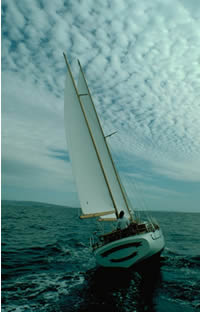 TB Well, we've had some very close friends, which have stayed with us all that time. In fact, several of us go sailing once a year for a week. We started off dinghy sailing with the college boats. I'm not sure whether they still exist, but…
TB Well, we've had some very close friends, which have stayed with us all that time. In fact, several of us go sailing once a year for a week. We started off dinghy sailing with the college boats. I'm not sure whether they still exist, but…
BB And you’ve met every year, so you would have been together 50 years.
TB Yes, we would have been together 50 years.
BB 50 years, every year, sailing.
TB This year we are due to go off sailing around Kos in the Greek Islands in October for our week.
BB Same group.
TB We’ve progressed from the cold waters around the British coast to the Mediterranean because we’re getting too old to stand the cold water any more.
BB What about the social life at that time?
TB Most of it centred around the bar and there's probably not much change these ideas. As Betty was saying there were no coffee bars at that time particularly, but one of the great events of the year was the March Hare’s Ball, which at that time was run by the University…
BB It was a festival.
TB And always took place in the Royal Festival Hall, which has got a fantastically sprung dance floor and for those who don’t know about it, it's still there.
BB They had big bands, didn’t they?
TB They had big bands at the time and it was very formal, it was…
BB Evening dress, ball gowns.
TB Evening dress, ball gowns etcetera. Great fun. Even if you couldn’t dance very well, and I'm a terrible dancer; my now wife, my girlfriend then, put up with being trodden on regularly.
BB And then what about the Queen Mother? She came to Claridges, do you remember the ball at the Claridges, the Commemoration Ball?
TB Once yes, the Commemoration Ball.
BB Where the women all had to wear white.
TB Quite a thing, that. I have to confess that a lot of what was said at the time, I put the notes down, wasn’t sure I had understood it fully, but it all stood me in good stead, later on in life. There were some real characters around, sad to say that many of them have passed on of course now.
BB What about when you bought a five-pound car, because that was all you could afford? Four or five of them had to buy it, a pound each.
TB What a good memory. Very close to Queens Garden, no, on the other side of Exhibition Road, where the hostels are, we found a 1936 Jaguar car, with chickens roosting in it and we hadn’t got much money, so the four of us, or were there five of us? Five of us, it cost us a pound each, clubbed together. It cost of five pounds to buy this car…
BB You offered it to the owner.
TB The owner was happy to see it go and one of the team had a motorbike so we towed it around with a motorbike…
BB All the students.
TB Pulling it around the corner. We dismantled it on the roadside, which was possible in those days. Used the College laboratories to re-engineer parts that needed making, put it together again, and that car took us down to the south of France on holiday, round the Le Mans circuit as fast as we could go, which was only about 70 miles an hour, couldn’t do more than that. Fantastic car and we finally sold it at a profit. If we had kept it, it would be worth a lot more money now than it was at that time. And that was typical of the time; students had very old bangers, as we tended to call them, and they re-built them using the College workshops, which everybody turned a blind eye to, to make the cars. They thought it was good training in fact for us to do things like that.
BB And there weren't as many foreign students, were there, at that time?
TB No, no, much smaller.
BB Not many women, and not many foreign students.
TB So, I think that’s about it.
Filming by Barbara Axt Portella.
© 2007 Imperial College London
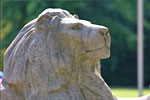
Through the first decade of the twenty-first century the campaign seeks to philanthropically raise £207 million from Imperial’s alumni, staff and friends, and donations from charitable foundations and industry.
Where your support can make a differenceGive now
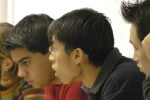
Imperial’s Centenary Year provides an opportunity to recognise and celebrate members of the Imperial community.
View staff and student portraits